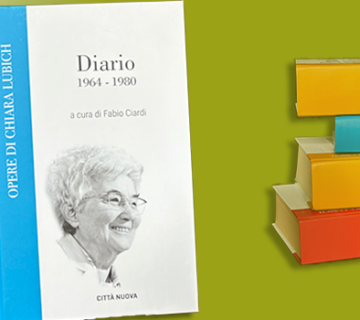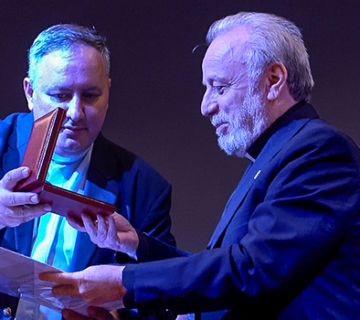It tells two stories, the story of the Focolare and that of the United States. In an air-raid shelter in the city of Trent (1944), Chiara Lubich and some other young women rediscovered the words of the Gospel: “that all be one” (Jn 17:21). A hundred-fifty years earlier the founding fathers of the United States wrote on their flag: “E pluribus unum,” of the many, one. Both phrases reveal a fundamental tendency: to aspire for unity in diversity.
 In the introduction of the book, “Focolare: living a Spirituality of Unity in the United States,” Thomas Masters and Amy Uelmen (New City Press, NY), begin with the stories of young people who practice the spirituality. Like Rebecca from Ohio, who was helped by the spirituality of unity to carry through with her decision to volunteer in Sierra Leone. Or Nick, who grew up in Baltimore, Maryland, who completed a Master in International Affairs and found himself face-to-face with his choice of relationship and dialogue in an environment that was strongly competitive.
In the introduction of the book, “Focolare: living a Spirituality of Unity in the United States,” Thomas Masters and Amy Uelmen (New City Press, NY), begin with the stories of young people who practice the spirituality. Like Rebecca from Ohio, who was helped by the spirituality of unity to carry through with her decision to volunteer in Sierra Leone. Or Nick, who grew up in Baltimore, Maryland, who completed a Master in International Affairs and found himself face-to-face with his choice of relationship and dialogue in an environment that was strongly competitive.
Elizabeth is a championship swimmer. She met the Focolare at a swimming competition in her hometown in Indiana: “When these girls who knew the Focolare came to my school, I was struck by the way they interacted with each other. The cultural mix – for someone from rural Indiana like me – made a strong impression. I felt like the whole world was in my backyard.”
“It wasn’t easy for me to explain to my friends who all these Europeans were, where I went and what we did,” recounts Keith, who grew up in a black neighborhood of New York. “But it was special with them, I felt drawn. We did the same things that I did at home with my friends: sport, games, but the atmosphere was different, we tried to love one another.”
The Focolare town of Mariapolis Luminosa in Hyde Park, New York, offers summer programs for teenagers. Naomi, a sixteen year-old from Chicago recounts: “Before leaving for Mariapolis Luminosa, I was a typical teenager: school, friends, shopping, enjoyment. It was hard for me to think of others. Well, this has all changed. When I returned home, I began to give away my things; I make my bed every morning; I try to prepare at least one of the meals each day; I listen to my eight year-old brother; I try to socialize with everyone at school. I don’t go shopping in the stores where a sweater costs a hundred dollars. I try to do everything for God, to make him smile. My mother is still wondering what happened to me.”
Finally, David from New York, who came to know the Focolare during WYD 2002 in Toronto. For him it has meant not becoming rigid in ‘devotional’ practices, but placing God’s love and love of neighbor at the centre of things: “As I rediscovered my faith in this way, I felt called by the Holy Spirit to become a priest, and now I’m in the seminary.”
These six experiences suggest that it is easier to understand the spirituality of the Focolare through the experiences of those who put it into practice. Beginning with the life of Chiara Lubich and those who joined her on this path, followed by the example of Americans young and old, families and clergy – this book tells the story of a shared experience of people whose lives have been transformed in an individual way, but also in a quite similar way by the light of God’s Love.


 Italiano
Italiano Español
Español Français
Français Português
Português


